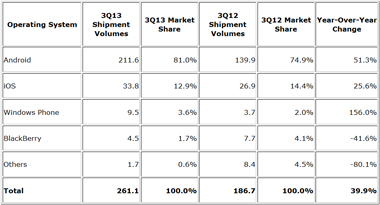News
Microsoft's Huge Q3 Windows Phone Market Gain
According to figures released today by research firm IDC, worldwide shipments of Windows Phone devices increased 156 percent year-over-year for the third quarter.
Roughly 9.5 million Windows Phone devices shipped in Q3, giving Microsoft's smartphone platform 3.6 percent of the worldwide market and putting it once again in third place behind Google's Android and Apple's iOS, IDC's data indicated.
While the 156 percent year-over-year growth rate is impressive, IDC acknowledged that Windows Phone had a relatively low base to grow from: Windows Phone shipped on just 3.7 million devices in last year's Q3, when it had 2 percent market share.
Additionally, while Windows Phone held steady as the No. 3 smartphone platform worldwide, its sub-5-percent market share was dwarfed by that of market leader Android, which captured 81 percent of the market in Q3. This was the first time Android's market share has passed the 80-percent-mark, according to IDC.
However, IDC said both Windows Phone and Android benefited from having a wide range of devices at different price points.
"Despite their differences in market share, [Windows Phone and Android] have one important factor behind their success: price," said Ramon Llamas, a research manager with IDC's Mobile Phone team, in a prepared statement. "Both platforms have a selection of devices available at prices low enough to be affordable to the mass market, and it is the mass market that is driving the entire market forward."
Besides demand for lower-priced smartphones, IDC said growing interest in so-called "phablets" (smartphones with screens between 5 and 7 inches) also drove the smartphone market's overall growth. Phablets comprised 21 percent of total smartphone shipments in Q3, compared to 3 percent in the year-ago period, according to IDC program director Ryan Reith. He noted that unlike iOS, the Android and Windows Phone platforms both have phablet devices in their portfolios (the latter through Nokia's recently unveiled Lumia 1520 and Lumia 1320).
"We believe the absence of a large-screen device may have contributed to Apple's inability to grow share in the third quarter," Reith said. iOS ended Q3 with 12.9 percent market share, down from 14.4 percent in the year-ago quarter, putting it in second place behind Android.
 [Click on image for larger view.]
Top four operating systems, shipments and market share, Q3 2013 (units in millions). Source: Source: IDC Worldwide Mobile Phone Tracker, Nov. 12, 2013.
[Click on image for larger view.]
Top four operating systems, shipments and market share, Q3 2013 (units in millions). Source: Source: IDC Worldwide Mobile Phone Tracker, Nov. 12, 2013.
Device manufacturer Nokia, which Microsoft is in the process of acquiring, shipped over 90 percent of all Windows Phone devices in Q3 -- the highest percentage since Nokia transitioned to the Windows Phone platform in early 2011. However, "participation from other vendors...still seemed a mixed bag with more vendors participating from a year ago, but volumes still far behind Nokia's own," according to IDC.